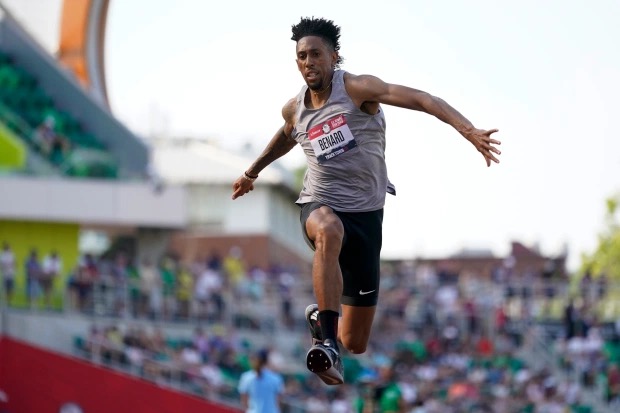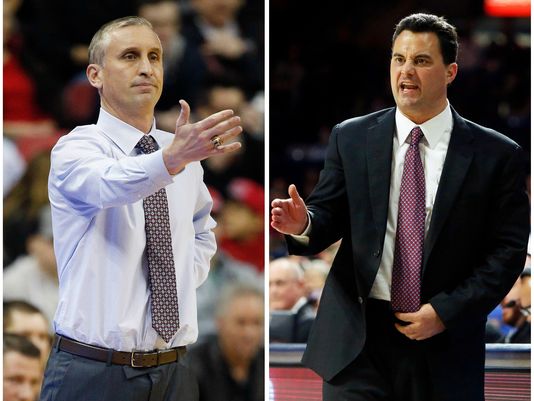Story By Evan Oscherwitz
Chris Benard has lived in California for most of his life, but in a way, Arizona is where he grew up.
It was at Arizona State, under coach Greg Kraft, that Benard began to blossom into a world-class athlete. During his three years in Tempe, Benard learned the skills that would help him navigate the treacherous waters of professional athletics and eventually propel him to two Olympic Games.
Chris’ greatness would reveal itself in time, but when he arrived on campus, he was a mostly unknown commodity. Despite his hugely successful career at Riverside College, Arizona State was one of the few large schools that showed interest in his services, and he was determined to make their investment worthwhile.
“ASU was my best offer for sure,” Benard said. “I was still a little bit naive at the time in terms of how recruiting worked. I wasn’t being reached out to a lot, but I don’t think I was necessarily putting myself out there a lot as well. The way that ASU was recruiting me definitely made me feel like I was worth going to that school.”
Before Benard could get to proving his worth on the track, he had to acclimate himself to the college lifestyle. Living on his own came with new responsibilities, but Chris saw his newfound independence as an opportunity to grow rather than a burden.
“I lived at my parents’ house all through [junior college],” he said. “Being on my own, it was an opportunity for me to figure out what kind of person I am and what I’m actually capable of. Through my college maturation, I started to trust my own understanding of things, just because I was thrown into the fire of life. I could either continue to be in my comfort zone of having things taken care of for me or I could start trying to depend on myself.”
No longer having to rely on his family for everyday conveniences made Benard feel more self-assured, and he used his new philosophy of responsibility and openness to growth as a means of reforming his training regimen. Although he was incredibly skilled as a jumper, Chris felt like his preparation habits needed to improve, and his time at ASU helped him come up with an approach to training that was conducive to success.
#tbt Chris Benard (@flyylikechrisb), the @sundeviltfxc record holder in Triple Jump with a leap of 16.74m (54-11.75) pic.twitter.com/sm8FteNlAj
— Sun Devil Track and Field/XC (@SunDevilTFXC) June 25, 2015
“It was all hard work-based,” he said. “I got into this mindset of ‘hard work is going to take care of everything.’ If you’re being told to do something, do it to 100% of your ability, don’t be afraid of the hurt that’s going to happen after. I was getting the reps at a high level and I think when you’re doing it like that, you’re going to get better.”
Chris did indeed get better over the course of his collegiate career. As a redshirt junior in 2012, he placed second in the triple jump at the NCAA Indoor Championships and won the same event at the PAC-12 Outdoor Championships. His results were good enough to earn him a place at the United States Olympic trials for the first time, and while he did not make the team, the experience was still beneficial. Being around the best jumpers in the country led Chris to once again examine his training habits, and the adjustments he made would take his career to new heights.
“[The Olympic Trials] are a big experience,” he said. “Leading up to that, the biggest meet that I had went to was the NCAA [championships]. Will Claye and Christian Taylor were there, and they’re my same age, but I was able to see what it actually takes to be at the elite level. I can’t say I was expecting too much. I had an understanding that I was good enough to make [the Olympic team] but I definitely didn’t understand what it takes to make it in those moments.”
Following the 2012 Olympic Trials, Benard returned for one final season at ASU before turning professional. Over the ensuing four years, he would continue to build his resume, winning four medals at the USA Outdoor Track and Field Championships and earning two podium finishes at the USA Indoor Championships. He was invited back to Olympic trials in 2016, this time earning a ticket to the Games alongside Claye and Taylor, the two jumpers he had idolized just a few years prior.
That "going to Rio" feeling (provided by @FlyyLikeChrisB)#TrackTown16 pic.twitter.com/clQyX4DVYM
— TrackTown USA (@TrackTownUSA) July 10, 2016
As surreal as it was for Benard to compete alongside two of his biggest influences, taking part in the Olympic festivities was even more difficult for him to process. Distractions were everywhere, and Chris found it difficult to focus on preparing for competition.
“I was just processing as I go,” he said. “I think that’s a lot of people’s experience at the Games if they don’t have someone keeping them a little bit more grounded. There’s so many things that you want the opportunity to do because you don’t really feel like you’re going to have this chance again.”
While Benard admits that he was somewhat caught up in the spectacle of the Rio Games, he still managed to finish 16th out of 48 competitors in his Olympic debut. Much like he did after his first Olympic trials four years earlier, Chris took time to evaluate his performance and considered potential improvements to his form.
https://www.instagram.com/p/B4-SxR5npoR/?utm_source=ig_web_copy_link
The result of Chris’ introspection was more improvement in the years that followed. He placed sixth at the World Championships in 2017 and set a new personal best at the USA Outdoor Championships that same year. As the 2020 Tokyo Olympics approached, he seemed destined for his second straight Olympic berth. Then, just as he was gearing up for trials, COVID-19 swept the rug out from underneath him. The Games were postponed, and Chris’ training facility closed, disrupting his routine and leaving him in a position of great uncertainty.
“I was definitely in a routine of being ready every summer,” he said. “I had been doing it like that for years, since high school. I think I was ignoring the fact that I might have been affected by all that was going on. It was definitely frustrating, and it was definitely stressful, but I didn’t give any attention to it in those moments.”
https://www.instagram.com/p/Bxh92tMnEWV/?utm_source=ig_web_copy_link
The possibility of having his Olympic comeback thwarted by factors outside of his control weighed heavy on Chris during the summer of 2020, but he was able to distract himself and stay in shape by performing basic workouts at his coach’s residence. The workouts helped hold him over until the resumption of the track season, and once trials rolled around, Chris refused to be denied his return to the big stage. He secured a trip to Tokyo with a jump of 17.01 meters, claiming the third and final spot on the American triple jump delegation.
Having learned from his first Olympic experience, Benard is traveling to Tokyo with a new game plan. In addition to his own aspirations of earning a medal, he is embracing his role as a veteran, and is focused on helping teammate Donald Scott deal with the pressures of being a first-time Olympian. Due to the unique regulations that will be in place during these Games, Chris expects there to be fewer distractions than usual, but he feels prepared to manage them if they come about.
“There’s always going to be a level of pressure,” he said. I’m going to accept that and try to be in the right mindset. Shifting my mind to the fact that it’s going to be more of a business trip than a pleasure trip is going to help prepare me.”
If Chris Benard’s career has proven one thing, it is that he only gets better as time goes by. His willingness to learn and experiment with new methods has helped him defy the aging process, and at 31 years of age, his finest hour may be yet to come. Of the 66 male track and field athletes that will compete for the United States at these Games, Benard is the only one who attended college in Arizona, and the Sun Devil faithful will be resting their hopes squarely on his shoulders come Aug. 3.
Whether Benard’s journey culminates in Olympic glory remains to be seen, but if it does, he will not forget where it all started.





